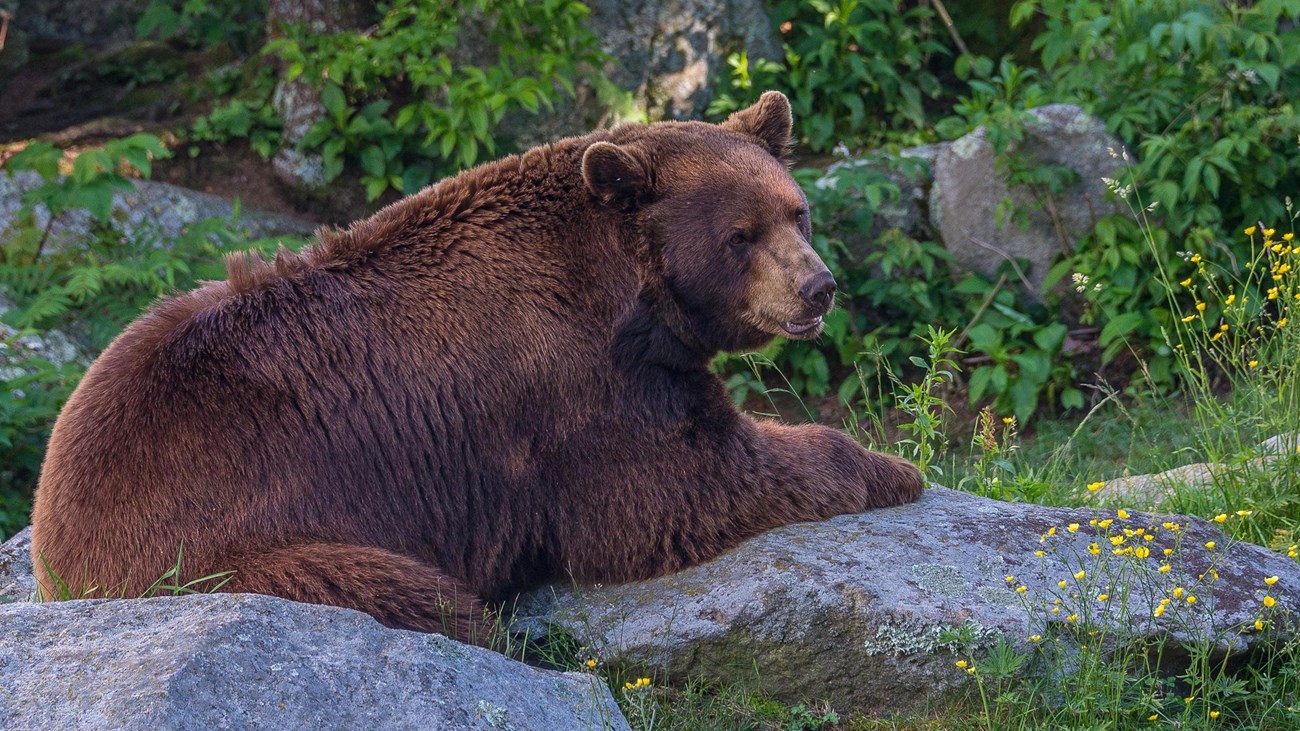Last updated: October 26, 2021
Thing to Do
Save A Bear's Life

Harold Blackwood photo
Seeing a black bear is an exciting highlight to any visit to a national park. But did you know that YOUR actions can have a direct and lasting impact on the health and behavior of one of these magnificent animals?
A Fed Bear Is A Dead Bear!
A bear's keen sense of smell leads it to insects, nuts and berries, but the animal is also enticed by the tantalizing smells of human food and garbage such as hot dogs, apple cores, and cookies left on the ground in picnic areas, campgrounds, and along trails. Feeding bears or allowing them access to human food and garbage causes a number of problems:
- It changes the bear's behavior and causes them to lose their instinctive fear of humans. Over time, these bears may begin approaching people in search of food and may become more unpredictable and dangerous.
- Bears that obtain human food and garbage may damage property and injure people. These bears pose a risk to public safety. Often, they must be euthanized.
- Studies have shown that bears that lose their fear of people by obtaining human food and garbage never live as long as bears that feed on natural foods and are shy and afraid of people. Many are hit by cars and become easy targets for poachers.
For these reasons, park rangers issue citations for littering, feeding bears, and for improper food storage. These citations can result in fines of up to $5,000 and jail sentences lasting up to six months.
The Biggest Threat to Bears is YOU!
How you behave while in the park has an impact on the safety of bears. Bears that cause property damage or injure humans may have to be euthanized. Please resist the temptation to feed bears. Remember, a fed bear is a dead bear! If you are careless with your food or litter, or intentionally allow a bear to get too close to you to snap a photo, YOU may be responsible for a bear's death!
What Can You Do To Protect Bears?
- Do not feed bears or other wildlife.
- Do not approach within 50 yards or any distance that disturbs a bear.
- Store all food items.
All food, coolers, utensils, cook stoves and other food items must be stored out of sight in a closed vehicle. Never leave food or coolers unattended (even for a minute!) - Keep your area clean.
Pick up food scraps and dispose of all garbage, including fruit rinds and cores, in a secure trash can or dumpster. Close the lid after depositing your trash. Do not place trash outside of an overflowing dumpster or trash can. - Report bear incidents.
If you see another visitor breaking these rules, or encounter a bear in a picnic area or campground, or in any other developed area, please call (828) 298-2491 or stop at a Visitor Center to report it.
What Do I Do If I See A Bear?
Black bears are wild animals that are dangerous and unpredictable. Although extremely rare, attacks on humans have occurred, inflicting serious injuries and death. Treat bear encounters with extreme caution:
- Remain watchful.
- Do not approach a bear. And do not allow it to approach you.
-
If your presence causes the bear to change its behavior (stops feeding, changes its travel direction, watches you, etc.) you are too close. Being too close may promote aggressive behavior from the bear such as running toward you, making loud noises, or swatting the ground. The bear is demanding more space. Don't run, but slowly back away, watching the bear. Increase the distance between you and the bear. The bear will probably do the same.
If a bear persistently follows or approaches you, without vocalizing, or paw swatting:
- Change your direction. If the bear continues to follow you, stand your ground.
- Act aggressively to intimidate the bear. Talk loudly or shout at it. Throw non-food objects such as rocks at the bear. Use a deterrent such as a stout stick. Act together as a group if you have companions. Make yourselves look as large as possible (for example, move to higher ground).
- Don't run and don't turn away from the bear.
-
Don't leave food for the bear; this encourages further problems.
If the bear's behavior indicates that it is after your food and you are physically attacked:
-
Separate yourself from the food and slowly back away.
If the bear shows no interest in your food and you are physically attacked, the bear may consider you as prey:
- Fight back aggressively with any available object!
-
Do not play dead!
Help protect others, report all bear incidents to a park ranger immediately. Above all, keep your distance from bears!
